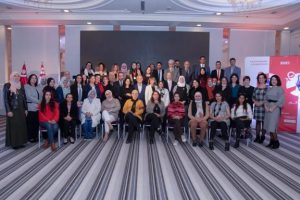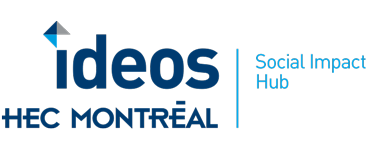
Group photo at the closing ceremony of the training and coaching program “Leadership for women entrepreneurs” in Tunisia. (Photo credit: femmesmaghrebines.com)
SEED, which stands for Scaling Entrepreneurship for Economic Development, is a cross-sectoral partnership involving IDEOS of HEC Montréal, Développement International Desjardins (DID), international funding agencies, local partners and research teams from three partner universities: The University of Navarra, the University of Alberta and Penn State University. The primary mission of this network of researchers and entrepreneurship pro-gram promoters is to mobilize research for the scaling of micro-enterprises, in Canada and internationally. DID, a Desjardins Group component formed in 1970, promotes the au-tonomy of disadvantaged populations through investment and technical support. These two development levers are the pillars of SEED projects.
DID has partnered with IDEOS to provide technical support to local or-ganizations with the goal of fostering entrepreneurs’ development and enhancing their individual and collective autonomy. Financial support is provided by international funding agencies.
SINCE ITS INCEPTION, SEED HAS LED DIVERSE PROJECTS
INNOVATION AS A KEY TO THE DEVELOPMENT OF SRI LANKAN MICRO-ENTREPRENEURS
The IDEOS hub and Développement international Desjardins (DID) formed their first partnership in 2018. In order to deploy its development program in rural Sri Lanka, DID took on IDEOS as a technical partner. The hub was tasked with providing expertise to SANASA, a local microfinance cooperative. The initial objective was to support 5,000 agricultural micro enterprises in their upscaling efforts.
Through this pilot research project, IDEOS identified resistance to change and lack of innovation as the main barriers to development for the 500 participating micro-entrepreneurs. Rather than seeking to stand out in order to grow, the farmers observed were simply copying their competitors, which undermined their financial security and, in turn, hindered the development of the local ecosystem.
Building on this initial result, the SEED research team then tested the effect of two different innovation approaches. One of them proved to be significantly more successful and better adapted to the local entrepreneurial community. SANASA thus gained an effective and validated innovation training method derived directly from its reality. The success and social impact of this project is undeniable: In the end, SEED far exceeded its target of 5,000 microenterprises; a total of 8,000 entrepreneurs received the training!
HAITI: KNOW YOUR GAPS FIRST; ACT AND TRAIN LATER
After SEED’s success in Sri Lanka, DID continued the partnership by joining the consortium for a research project in Haiti. This time, the HEC Montréal research hub was asked to analyze the Haitian entrepreneurial ecosystem and identify its main weaknesses. Given the turbulent local political context, the study also had to assess the harmonization of the existing entrepreneurial development programs.
SEED’s involvement as a technical partner was highly regarded as a first step toward improving the Haitian local and national entrepreneurial ecosystem. The project has attracted much interest and has been presented to several international agencies and local ministries.
LEADERSHIP AMONG TUNISIAN WOMAN ENTREPRENEURS: TWO EN-TREPRENEURIAL APPROACHES TESTED
The most recent SEED project was carried out in Tunisia. In association with Global Affairs Canada, DID and the local foundation DAAM (Développement Accompagnement Appui aux Micro-entrepreneurs), IDEOS drew on its expertise to support the advancement of Tunisian women entrepreneurs. The main objective of the mission was to strengthen the participants’ growth, innovation, resilience and leadership capacities.
Through its research, IDEOS began by pinpointing the main barriers to the development of female entrepreneurial leadership in Tunisia, namely the lack of opportunities for dialogue and the difficulty in ensuring work-family balance. During this project conducted with 230 women entrepreneurs, two training sessions were delivered to two distinct and randomly selected groups of participants. The content of both training programs was the same, but the entrepreneurial approaches differed: One focused on the market and the other on the community.
The study found that two main criteria must be taken into consideration when deciding how to best support women entrepreneurs in Tunisia: The age of the woman entrepreneur and that of her company. The interest, commitment and rigour demonstrated by the participants throughout the training, as well as the local partners’ reinforced confidence in the importance of training as a vector for growth, are proof of the success of SEED in Tunisia, and bode well for future endeavours between these partners.
- https://www.youtube.com/watch?v=BkuupZ9WRAE
- https://www.youtube.com/watch?v=URSWuaDnzuU
- https://www.linkedin.com/feed/update/urn:li:activity:6859154800626544640
BENEFITS OF SEED AND FUTURE PLANS
Needless to say, SEED can produce many benefits. Through its various partnerships, IDEOS is enhancing its ability to access more grants to increase its research budgets, find new resources and develop more projects. Moreover, the tangible social impact in the field paves the way for further research, generates more case studies, and consequently enriches the body of educational material.
Although SEED’s journey is just beginning, its pipeline of short and medium term projects is already well underway. Various partnerships are currently being developed in Africa, Latin America and the Caribbean. The first project in 2022 will take place in Colombia. IDEOS is also actively developing SEED on the national level. The research hub is working in tandem with several partners to create a platform that would bridge the gap between research and social impact on the ground across the Canadian provinces.
Finally, project after project, the SEED consortium is strongly contributing to raising the profile of HEC Montréal and its IDEOS hub as social influencers.
